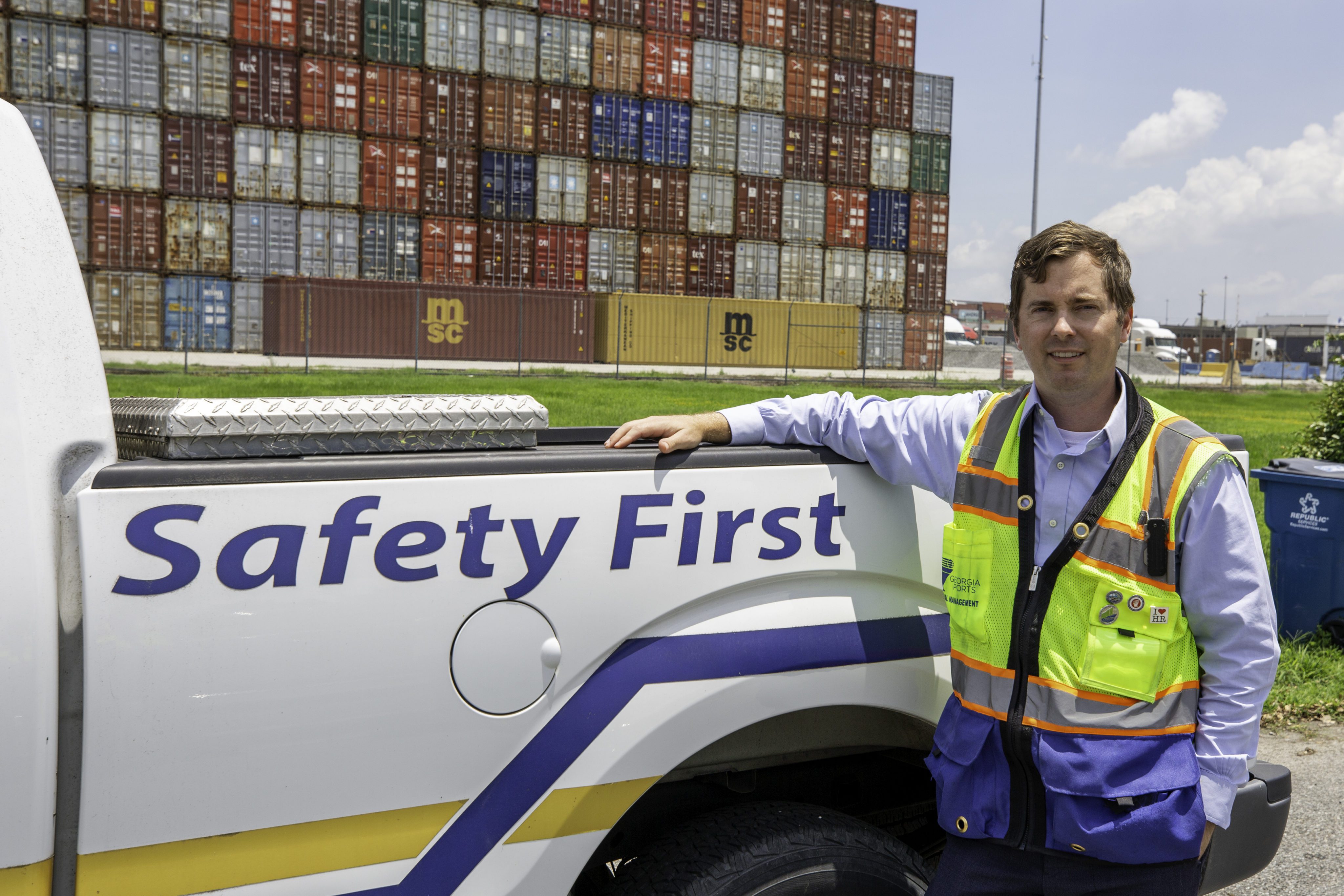General Manager of Corporate Safety Jason Hunt said the department has implemented several measures to streamline safety at Georgia Ports facilities.
Georgia Ports safety team streamlines rules, educates terminal users
Ensuring every person that steps foot on a Georgia Ports facility returns home the way they arrived is the Authority’s top priority. As business continues to grow at a record pace, this mission becomes even more critical.
Reducing on-terminal injuries requires that individuals be mindful of their surroundings and deliberate in their actions. GPA officials encourage port users to take the extra time needed to do the job right the first time, even when no one is watching. When he joined the GPA, General Manager of Corporate Safety Jason Hunt said his first goal was to understand the organization’s core values and what role those values play in safety.
Hunt spent 20 years working with several United States government agencies including the U.S. Department of Defense, U.S. Environmental Protection Agency, the Occupational Safety and Health Administration and the U.S. Drug Enforcement Administration. Before the move to GPA, he was overseeing safety for Universal Orlando Resort. Hunt said Universal Orlando created a dynamic working culture that presented numerous hazards and guest interactions every day.
The theme parks’ constantly evolving environment and communication are similar to the work required at GPA and prepared him for the role.
“Georgia Ports is a leader in logistics,” Hunt said. “This was a great opportunity to expand my knowledge of safety and apply it to a new field.”

Corporate Safety Manager Steven Peschock spent 13 years in U.S. Army Aviation where he began working in the field of safety. The Army allowed him to work with multiple government agencies including OSHA, DEA, the Central Intelligence Agency, and the Federal Bureau of Investigation. Peschock also spent a year in the D.C. metro area working at the EPA headquarters.
He first learned about the importance of safety flying in combat as a helicopter pilot where he was responsible for his aircraft and his crew. As an air mission briefer, he would brief pilots on flight routes and planning to ensure mission success. He also had no previous maritime experience but set his sights on GPA when his wife wanted to move back home to Savannah.
“I married a Georgia girl and we both love Savannah,” Peschock said. “When I took time to meet the players at GPA, I ended up falling in love with the organization.”
Hunt and Peschock hit the ground running when they joined the GPA team in April 2019. They spent the first 16 months learning about the industry and GPA business while reviewing procedures, rules and regulations that were in place.
Hunt said volume at the facilities, especially Garden City Terminal, creates potential hazards with the sheer number of vehicles, workers and contractors working in the same footprint. Hunt said that requires constant observation to mitigate possible injuries, accidents, and property damage.
Peschock said this requires the department to stay on top of new construction projects and traffic patterns to keep terminal users up to date on changes.
Hunt and Peschock have implemented several changes to streamline safety and educate terminal users. This includes a condensed version of terminal safety rules found on GPA’s website, moving everyone to the same digital reporting platform, creating internal safety councils, producing terminal user instructional videos and incorporating comprehensive safety training at new hire orientations.
“This is a large, dynamic facility and we take safety very seriously,” Hunt said. “It’s up to everyone to ensure that GPA remains a safe place to conduct business, day in and day out.”
On-terminal injuries have continued to see year-over-year improvement in Hunt and Peschock’s first three years. In fact, there has been a 40 percent decrease in lost-time accidents during that period.
“We’re trying to build a program that not only educates people, but also rewards positive behavior,” Hunt said.
Peschock pointed out that Hunt has also invested time in building relationships and improving communications with GPA partners including Gateway Terminals and the trucking community. Hunt said it’s important to hear from drivers calling the Port of Savannah every day and listen to their concerns regarding traffic flow and road markings.
“We want drivers to have the best experience possible at our facilities,” Hunt said.
Peschock, who was a combat pilot in Afghanistan, said the constantly changing battlefield helped prepare him for the evolution at GPA’s facilities.
“We have to constantly reevaluate the current footprint to meet tomorrow’s volume,” he said.
This proactive approach now includes an observation module that requires supervisors to spend time as a field mentor to get feedback from equipment operators and foster relationships at all levels.
Hunt said measures like this allow the department to get ahead of issues. He said the team works with stevedores, longshoremen and motor carriers to identify potential problems. In the past, this has included updating on-terminal signage and ensuring road markings are accurate. With the launch of the Navis N4 operating system, the team worked cohesively with GPA’s Information Technology department to create easy-to-read gate tickets.
Peschock said being more hands-on has allowed the department to correct issues in a timely manner. Tools such as QR codes for reporting near-miss incidents and safety concerns have also helped streamline the process. He said all terminal users have done a great job working with the team and embraced them to make the GPA a better place to work.
“Safety is a team effort at GPA, and we want to make sure all voices are heard,” Peschock said. “This is everyone’s port.”
